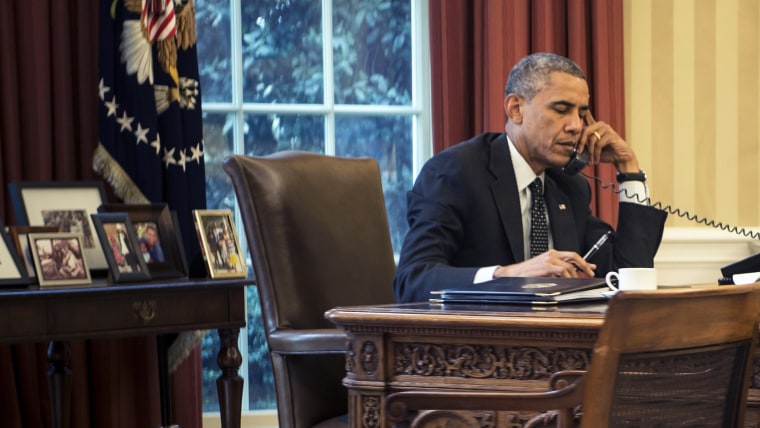There was something funny about the
Weekly Standard denouncing President Obama's new policy on Cuba by running
a piece from, of all people, Elliott Abrams.
It was Abrams, for example, who pleaded guilty to withholding information from Congress during the Iran-Contra scandal, before serving on the Bush/Cheney National Security Council, which
didn't turn out well for anyone.
Nevertheless, the noted neoconservative has taken a look at the White House's shift on Cuba, and Abrams is not impressed.
The American collapse with respect to Cuba will have repercussions in the Middle East and elsewhere -- in Asia, for the nations facing a rising China, and in Europe, for those near Putin's newly aggressive Russia. What are American guarantees and promises worth if a fifty-year-old policy followed by Democrats like Johnson, Carter, and Clinton can be discarded overnight? In more than a few chanceries the question that will be asked as this year ends is "who is next to find that America is today more interested in propitiating its enemies than in protecting its allies?"
Just at face value, it's hard not to marvel at the underlying argument here. The United States stuck to an ineffective policy for more than a half-century. For Abrams, that suggests (a) the policy must have been good, since it stuck around for so long; and (b) we should continue to embrace the failed policy to demonstrate to the world how consistent we are.
I suppose this has a certain Burkean logic, though it's hardly the basis for a sound, sensible foreign policy. As Simon Maloy
joked, paraphrasing Abrams, "How can they trust the U.S. when we'll only adhere to a policy position for five decades for no discernible reason?"
But taking this one step further, by Abrams' reasoning, the international reaction to the White House's announcement would necessarily be negative. After all, according to the neocon argument, yesterday undermined global confidence in "American guarantees and promises."
So foreign condemnations of the administration's new policy were common yesterday, right? Well, actually no.
Not long after the White House officially announced the shift,
this press release started making the rounds, capturing the reaction from many Latin American officials:
The Secretary General of the Organization of American States (OAS), José Miguel Insulza, today welcomed the "historic announcement" made by the Presidents of Cuba and the United States, Raúl Castro and Barack Obama, of the resumption of diplomatic relations between the two countries, as well as the re-opening of embassies in Washington and Havana, the lifting of certain commercial restrictions and the beginning of new paths for cooperation on issues of mutual interest, among other measures. The OAS leader congratulated President Barack Obama "for having taken these historic steps, as necessary as they are courageous, to restore diplomatic relations broken off in 1961." "This is a decision of great vision on both sides, because this conflict, which has significant negative implications for citizens of both countries, had stagnated politically for too long," said the Secretary General.
Around the same time, French officials announced their
enthusiastic support for the breakthrough, as did Canada, which helped host the talks that led to the agreement.
I've looked for an example of a foreign government criticizing the news -- you know, because of the realization that "American guarantees and promises" are apparently no longer worth anything -- but none has turned up.
It's almost as if Elliott Abrams' criticism has the entire foreign-policy dynamic backwards.
